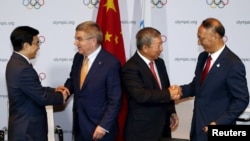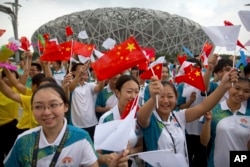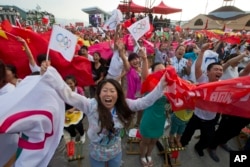China has won the bid to host the 2022 Winter Olympics in its capital of Beijing, making it the first city to host both the summer and winter games. The decision comes despite vocal concerns from international rights groups and activists who say awarding Beijing is the wrong decision given its rights record.
The vote to decide which of the two remaining cities bidding for the games would win — Kazakhtsan’s Almaty and China’s Beijing — was a close one with 44 voting in favor of Beijing to 40 for Almaty.
A slight technical hiccup marred the process, when International Olympic Committee members had to switch from electronic tablets to submit paper ballots.
IOC President Thomas Bach announced the decision.
"The International Olympic Committee has the honor to announce the host city of the Olympic Winter Games 2022 - Beijing," he said.
Chinese officials and members of the bidding team who were at the IOC vote in Kuala Lumpur, Malaysia leapt up from the seats and hugged one another after hearing the decision. Some shed tears. In a rare display of emotion, an anchor on the state-run CCTV news channel had to pause when starting off his report about the decision to control his excitement.
In Beijing, outside the iconic Birds Nest, which was a main venue for the 2008 Summer Olympic Games, elderly women were dancing and singing — in what appeared to be more of an organized gathering than a spontaneous celebration. Others waved the Chinese flag and stood on the Great Wall.
Promoting winter sports
In the city of Zhangjiakou, nearly 200 kilometers outside of Beijing where some of the events will be held, local residents were ecstatic. In other parts of Beijing, however, there were few celebrations, while most were pleased with the decision.
Well known Chinese athletes such as Yao Ming — a member of the bidding team for the games — see the awarding of the bid to Beijing as an opportunity to ignite interest in winter sports here. Officials claim that China could see some 300 million take up winter sports.
Without a doubt, the decision will be a major boost for winter sports in China such as skiing, ice hockey and figure skating, but rights activists in and outside of the country are concerned.
Human rights concerns
Minky Worden, director of global initiatives at Human Rights Watch says the awarding of the games to repressive governments such as Russia or China only helps exacerbate the rights situation.
In a video statement released shortly after the announcement was made, she says the decision comes at a time of the worst crackdown on rights in China in more than two decades.
“Activists and lawyers have been locked up, independent media has been shut down and the great firewall of China, the Internet censorship that the country is so famous for, is worse than ever,” said Worden.
The IOC says it has received assurances from China on human rights, but rights activists say China’s behavior in the run-up to the 2008 games and after tells a different story.
Alistair Currie, who is with the rights group Free Tibet, says that while seven years is still a long ways off, China has already shown that it won’t keep its promises.
Doubts about promises
“What we’re seeing across China at the moment is even deeper hostility to human rights and democracy than we saw back in the period before the 2008 Olympics. It is one of the reasons why it is so concerning that the IOC has ignored all of this,” said Currie.
In the run up to the games, Beijing has pledged to spend more than $7 billion to clean up its notoriously smoggy air — which is at its worst typically in the winter.
Officials also say that their hosting of downhill events in the parched mountains of Zhangjiakou, which is expected to rely heavily on man-made snow, will have a minimal impact on the environment. Environmentalists and scientists are skeptical of that pledge.






